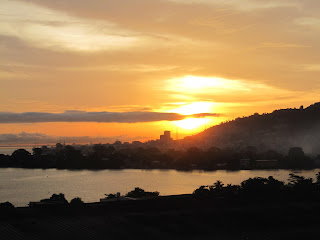Sierra Leone (Lion
Mountains) was named by the Portuguese back in the 1400s on seeing the range of
wooded hills that sit back from the coastal beaches lining the length of the
Freetown peninsula. The city is situated on the northern tip of the peninsula,
Atlantic Ocean to one side and Africa’s largest natural harbour opening from
the mouth of the Sierra Leone River, on the other.
The site was
chosen in 1787 by the British as a settlement for freed slaves that had become
destitute in England as a consequence of the abolition movement. This tropical idyll was touted as a haven for
the new settlers but the reality was somewhat different; conditions were harsh
throughout the rainy season and many died as a result of disease and
starvation. This first settlement was
actually burnt down by a local ruler but a second attempt to form a colony was
made 5 years later in 1792.
This time, the
settlers originated from Nova Scotia, freed slaves who had fought for the
British during the American Revolution.
The original settlement had been reclaimed by the jungle but the new
colonists cleared the forest as far as a giant cotton tree which still stands
at what is now one of the busiest junctions in the city, next to the colonial
era Courts of Justice building. The conditions were tough for the first
inhabitants of the Freetown Colony but through hard work and determination,
they began to prosper. The Sierra Leone
Creole people (Krio) went on to establish and populate what is now the capital
of the country and shape what was to become a centre for culture and education.
The Cotton Tree
British
influence remained, initially in order to shield the town from the demands and
taxes of indigenous leaders, but subsequently to intervene in the ongoing
trading of slaves whilst also protecting its own trading interests in the
region and expanding the protectorate into the hinterland. The settlement became a Crown Colony in 1808
and went on to become the capital of British West Africa. Independence arrived in 1961 but transition
was far from a smooth process.
During the
next 20 years, corruption became commonplace as society and the economy began
to break down. The country endured a
series of coups and attempted coups, becoming a republic in 1971 and was a
one-party state by 1978. With a divided
society established as a legacy of colonial rule, an unstable government and a
marginalised youth, the country was a powder keg ready to ignite. In 1991, civil war broke out when the
Revolutionary United Front (RUF) crossed the border from Liberia and within a
year the president had been deposed. In
1999, Freetown itself was taken for a brief time by rebel forces. A ceasefire was finally declared in 2002, by
which time it was estimated that 50,000 people had been killed in a decade of
terrible violence and civilian suffering.
The country
slowly started the re-building process; in 2005, the last UN peacekeeping force
left the country and a new president was democratically elected in 2007. The country has a vast array of natural
resources; diamonds, titanium and iron ore, bauxite and gold can be found in
abundance and foreign investment in these industries, as well as fisheries and
agriculture was helping to expand the economy.
Money was being invested in desperately needed infrastructure projects
and GDP began to grow. All this progress
came to a dramatic halt, however, in May 2014 when the first case of ebola
virus disease was detected. By
September, Freetown was in lock-down and under-siege from a very different type
of threat.
Fast forward
12 months, the threat is diminishing, and the city is once again trying to
re-build. People go about their daily
business, the streets are crowded with stalls, there is laughing and shouting
in equal measure and car horns sound relentlessly in the impatient queues of
traffic. This is a noisy and lively
city, from the call to prayer before sunrise to the sound of music well after
sunset into the early hours, activity never stops. Young men play football on the beach, the
bars are open and music is playing.
Freetown is a chaotic city but it possesses a welcoming charm and even a
certain beauty when viewed from the quiet of the surrounding hills.
There are many
challenges ahead for the government and people of Sierra Leone but I feel
privileged to witness the start of what I hope will be a positive new chapter
in the turbulent history of this remarkable country.
Sunrise over Freetown
The city viewed from Leicester Peak
Football on Bureh Beach





